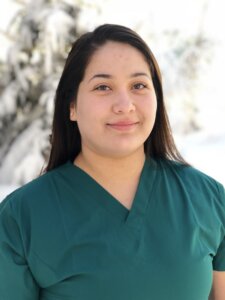 By Linden Stackiokas
By Linden Stackiokas
Interested in a career where you help others? Want a job where you never quite know what will happen that day? Need a lot of flexibility because of family responsibilities? Tori Stein wanted all these things and found them when she became a TCC health aide.
Tori was born in Fairbanks but was raised in Ruby, a village of about 180 people located on the south bank of the Yukon River, about 50 air miles east of Galena and 230 air miles west of Fairbanks. She was introduced to the idea of being a health aide when her mother became one; hearing about and watching her mother do her job only fueled Tori’s interests in health, science and helping people. When she graduated from high school, Tori completed the University of Alaska program to become a Certified Nursing Assistant in Fairbanks.
About two years later, Tori’s mother called to let her know that there was a health aide position open in Ruby. Before she could be admitted to the program, Tori had to have the approval of the Ruby Tribal Council. It was only with their consent that she was enrolled in the TCC health aide training program.
The training, which takes place in Fairbanks, is known for being intense. Tori had an advantage in that her nursing assistant job had exposed her to a lot of medical terms and practices, but it still required plenty of hours of studying and dedication. She knows the idea of so much academic work might cause some people to hesitate, but she says that the amount of support the instructors offer “is amazing.” As long as a student has the desire and makes the effort, the staff will keep working alongside the student until he or she passes.
Tori has been a health aide for seven years, although she no longer works in Ruby but is now an itinerant health aide. At the time Tori finished her training she was married to a soldier based in Fairbanks, so she moved to Ruby alone in August of 2016, and he visited her as he could. In January of 2018, Ruby transferred to the job she currently holds.
Being an itinerant gives Tori the flexibility to accept assignments when she wants, which allows her to work around her family’s needs (Itinerants can usually pick their schedules, as long as the stay is for a minimum of 10 days). She is still married to her high school sweetheart, and they now have a four-year-old son. She still gets back to work in Ruby sometimes, but also goes to other villages.
Tori has no plans to leave her career, still finding it interesting after all these years. “I love not doing the same thing every day. Of course, there is structure, like having set clinic hours. But you never know what is going to walk through the doors.” The variety in the day, as well as the constant changes as she moves from village to village, would be difficult to find in another job.
One surprise, something she did not really anticipate while in training, was “how much we have to keep learning. There is always new information about illnesses, new medications, new procedures. And there are technological changes, like new software programs. It keeps things interesting.”
Being a health aide can be incredibly stressful. The volume of work, not always being able to help a patient because an illness is too far advanced, and, worst of all, losing a patient takes a toll on mental and sometimes physical health. Working in small villages is not like practicing in a large town because you get to know people as more than patients. You see them every day in the store, playing with their children and grandchildren, just chatting to each other in the street. When someone dies, it impacts the entire community, but especially the health aide who has been caring for the most intimate needs of the person. To deal with the stress, Tori plays sports, including softball and basketball. She also enjoys spending time with her family, hunting, and fishing. In quieter times, she beads.
Asked if there is anyone she especially wants to thank for helping her in her career, Tori mentioned her previous supervisor, Keith Lund, and her current supervisor, Jo Miller. They have given her constructive feedback, sustained her in times of stress, and have administered pep talks when Tori wondered if she was up to handling a task. She also named Leda Cruger, who, among other things, is the person who arranges all of the traveling health aides do. However, as Tori said, “That’s not all she does, she wears many hats. On top of being very busy, she takes the time to lend an ear and help problem solve when needed.” While she finds all of her colleagues and the management of TCC supportive, these three individuals stand out in her mind.
Most people do not love the idea of being interviewed for an article, and Tori was no exception. But she hopes that reading about her experiences will help others consider entering the field. The need for more health aides is great, but so are the personal and professional opportunities given to those who enter the field.
